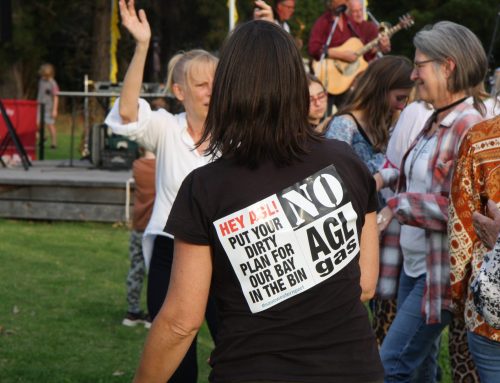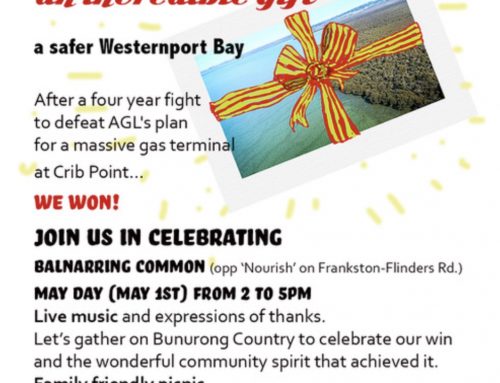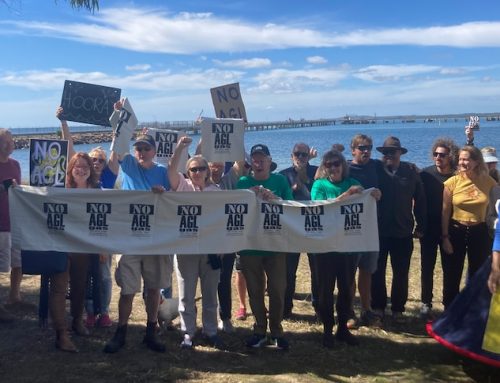People who gathered at last Sunday’s Save Westernport rally in Hastings assembled into the shape of an enormous ship just HALF the length of the 295m gas processing tanker that AGL want to PERMANENTLY moor at Crib Point jetty.
In her speech at the rally Karri Giles from Westernport Bay Protection Council said people who scuba dive say that Westernport Bay is more healthy and diverse now than most places around the world.
Westernport Bay is worth billions every year in its healthy state, and is too precious to lose.
We will ask for a bond if the full-scale [Kawasaki] project is proposed.
The economy of this area depends on it being a recreational area with the associated health benefits.
Today here we are beach goers, sailors, scuba divers, residents, holiday house owners, ecotour operators, marine educators, school camp operators, restaurateurs, surfers, snorkelers, dog walker, fishers, paddlers, and boaters We love Westernport Bay and will fight for it!
– Karri Giles, from her rally speech on July 1st
Common sense and science should tell us that this industrial development is not suitable for Westernport, and an Environmental Effects Study [EES] will confirm that fact.
Now that we understand the disastrous effect that pollution from industry has had on the seagrasses and mangroves in the Bay, these industries must not be allowed to operate in the rare areas that still remain. The mangroves and seagrasses that support so much of the marine life in the Bay are only beginning to regenerate since the downsizing of the petrochemical industry in Westernport.
Areas of undisturbed or rehabilitating wilderness must take priority over the location of heavy industry, and big companies like AGL whose track record with the environment is so poor must be required to pay a bond large enough to offset damage caused by their operations.
It’s not as if any amount of money could ever compensate for the loss of precious wilderness and essential habitat, but it should ensure that proper precautions are taken by corporate interests whose only serious considerations otherwise tend to be their bottom line and the corners they can cut to improve it. A tennant cannot secure the right to rent a property they don’t own without an upfront payment for any potential damage. Why should it be any different for companies? Our natural resources need to be protected in the same way from the likely hazards of big industry.
Communities that have been disadvantaged by accidents and damage caused by big industry have learned this the hard way.
During the unfortunate period when our old growth forests were being exported as woodchip, no one realised that ballast water in Japanese ships was carrying the Northern Pacific Seastar into our waters. The N.P. sea star has gone on to infest and devastate fish stocks in the cold woodchip ports of Port Phillip Bay and the Derwent estuary in Tasmania.
With the disastrous effect they have on marine life and their incredible ability to out-compete other marine organisms, we are extremely lucky that these exotic pests have not been introduced into Westernport.
We do not have the Northern Pacific sea star here, and we DO NOT WANT IT ! The most effective action we can take to avoid their introduction is to is to limit unnecessary shipping.
Under AGL’s proposal, up to 80 gas tankers per year would enter Westernport from around the world to dock and unload their cargo at Crib Point jetty. AGL has said that to avoid infestation from introduced marine life, LNG tankers would flush their balast tanks out at sea. But the company’s reps also admit that they would have NO CONTROL over these practices. The same is true of the essential safety and emergency training of international crews onboard the foreign ships supplying the permanent FSRU factory tanker with LNG.
The AGL proposal has so many risks to the Environment, to the safety and well being of local people, to local property values and to businesses and farms that will be disrupted all along the proposed route of the 60km pipeline to Pakenham.
Despite all their talk about “securing our energy future”, we now know that the AGL plan to import gas is not essential. It is intended only to secure opportunistically derived profits for that company and its shareholders, without care for any detrimental effect it would inevitably have on the people of Westernport and its precious Environment.
The project is ill-considered, unessential and unsupportable.




